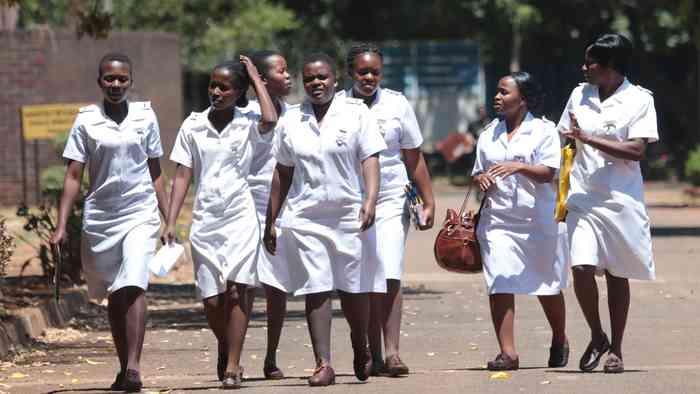By Own Correspondet
The Zimbabwean government has confirmed it is considering scrapping student nurses’ salaries to curb significant challenges within the recruitment process and to attract individuals with passion and a calling.
According to media reports, the government policy shift is driven by recent complications in recruitment with corruption fuelled by administrators demanding huge amounts from aspiring nurses.
Recently, some nursing students have been caught in a web of fraud after submitting fake certificates and the Ministry of Health and Child Care has responded to the issue by intensifying verification of qualifications.
This action was a direct response to a series of fake certificate scandals uncovered at major hospitals like Mpilo Central Hospital and Parirenyatwa Hospital in Harare. Legal and Parliamentary Affairs Minister Ziyambi Ziyambi addressed the issue in the Senate, confirming new verification measures were in place. He stated:
“The Minister of Health and Child Care is now vetting through ZIMSEC and they have tasked ZIMSEC to confirm whether the papers are genuine. This is the path we are taking because we have seen that a lot of people are conning the ministry through the system.”
Minister Ziyambi acknowledged the severity of the problem, noting:
“Indeed, it is true that we have such con artists who forge papers and pretend that they are qualified.”
The twin issues of funding and fraud have sparked a heated public debate about the future of Zimbabwe’s healthcare training. The potential scrapping of salaries has divided public opinion, with some supporting the move and others viewing it as a failure of governance.
Manicaland Senator Maxwell Mdhluri had previously raised alarms about the infiltration of unqualified personnel, warning that it endangered lives and wasted public funds.
As the government considers this significant change, student nurses and the public await a final decision on salaries that will profoundly impact the recruitment and motivation of future healthcare.
A Mpilo Central Hospital trainee nurse was hauled before the courts for allegedly forging academic qualifications to secure admission at the institution’s nursing school.
Thelma Gurupira, 23, of Mbare in Harare, appeared before Bulawayo magistrate Takudzwa Gwazemba charged with tendering a fake Zimbabwe School Examinations Council (ZIMSEC) certificate.
Gurupira applied for a place at Mpilo’s School of Nursing in 2017 despite lacking the required number of Ordinary Level passes. She allegedly presented a forged ZIMSEC certificate claiming six passes in the November 2017 exams.
“Mpilo School of Nursing acted upon the fake document and enrolled the accused person as a student nurse, where she trained from September 2022 to September 2025,” Sithole told the court.
Two student nurses at Chitungwiza Central Hospital were exposed for using fake Ordinary Level certificates to enrol in the government nursing program.
Paidamoyo Samantha Muchira and Makanaka Chatikobo successfully gained admission into the nursing school and attended classes for an entire year before the fraud was uncovered through routine verification checks with the Zimbabwe School
At Gutu Mission Hospital, a third-year trainee reportedly disappeared out of the hostels and vanished after learning that officials were about to conduct a verification exercise on students’ O-Level certificates. Investigations later revealed that the student only had four O-Level passes but had used a forged certificate showing six subjects to secure a place in the nursing programme.
However, insiders allege that corruption has become deeply entrenched in the recruitment process.
“It is now an open secret that getting into nursing school requires paying a US$1 500 bribe,” said a source close to the recruitment process. “No one gets in without paying. Academic merit is no longer the determining factor.”
The source further claimed that political influence also plays a major role in admissions. “Nursing schools reportedly reserve three out of every fifteen available places for ZANU PF officials, who then give them to their relatives,” the source added.








Leave a comment